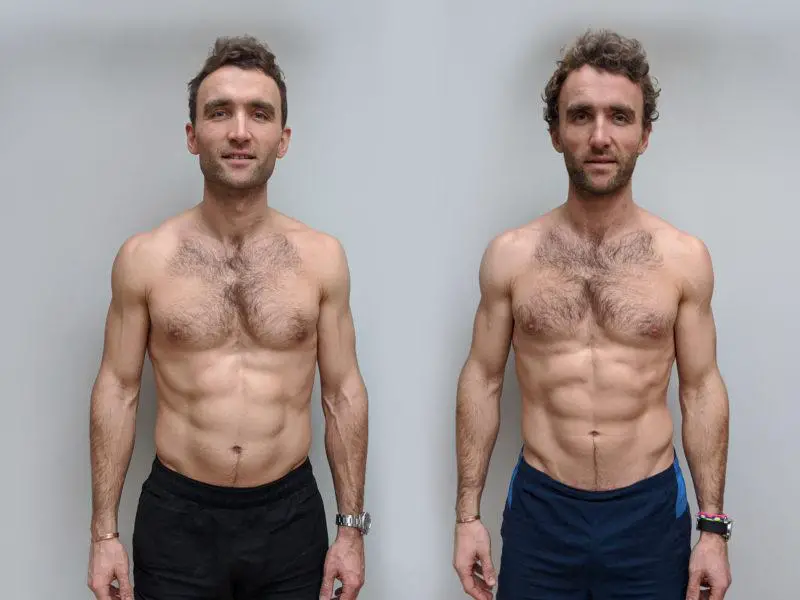The quest to understand the impact of different diets on health takes an intriguing turn with the story of identical twins Hugo and Ross Turner. Known for their adventurous spirit, these twins embarked on a unique dietary experiment under the auspices of King’s College London. The goal was simple yet profound: to unravel how a vegan diet compares to a meat-inclusive diet in terms of health effects, utilizing their identical genetic makeup as a living laboratory.
Over 12 weeks, Hugo adopted a strictly vegan diet, eliminating all animal products, while Ross maintained his regular diet, rich in meat and dairy. This groundbreaking study sheds light on the fascinating interplay between diet, genetics, and health, offering valuable insights into how our bodies respond to what we eat. As we delve into their journey, we uncover surprising revelations and the potential implications for personalized nutrition.
The Health Shifts of a Vegan Diet, According to the Study
Hugo’s shift to a vegan lifestyle brought about some noteworthy changes, highlighting the potential health benefits of plant-based diets. During the 12-week experiment, Hugo experienced a significant reduction in cholesterol levels, a finding that aligns with previous research indicating the cardiovascular benefits of vegan diets. A 2019 study in the Journal of the American Heart Association supports this, suggesting that plant-based diets can lower the risk of heart disease.
Additionally, Hugo noted an increase in his resistance to type 2 diabetes. This improvement mirrors the findings of other studies that have linked vegan diets to better blood sugar control and reduced diabetes risk. Beyond these physical health markers, Hugo reported feeling more energetic, a sentiment echoed in a 2018 study that observed improved psychological well-being among individuals following vegan diets.
However, adopting a vegan diet also requires careful consideration of potential nutrient deficiencies. The study points out the importance of ensuring a well-balanced vegan diet, particularly rich in vitamin B12, iron, and omega-3 fatty acids, to avoid nutritional gaps.
Hugo’s experience underlines the health-promoting potentials of a vegan diet, including the reduced risk of chronic diseases and potential weight loss benefits, as noted in a 2016 position paper from the Academy of Nutrition and Dietetics. His journey through the experiment showcases how a well-planned vegan diet can contribute positively to one’s health profile.

The Health Dynamics of a Meat-Inclusive Diet
Ross’s adherence to his regular diet, which included meat and dairy, presented a contrasting set of results. While he maintained stable gut bacteria diversity—an essential factor for overall health—he also experienced fluctuations in energy levels. This observation raises intriguing questions about the balance and stability of energy provided by omnivorous diets.
Meat, particularly red and processed types, has been associated with several health concerns, including an increased risk of heart disease and certain cancers. However, it’s important to recognize meat’s nutritional value, offering essential nutrients like proteins, B vitamins, iron, zinc, and amino acids, crucial for various bodily functions.
Ross’s experience mirrors broader nutritional insights regarding diets that include meat and dairy. While these diets may have a higher energy density due to their fat content, particularly saturated fats, they also contribute significantly to a balanced nutritional profile. This balance is vital for maintaining muscle mass, supporting immune function, and overall vitality.
The study brings to light the nuanced relationship between meat consumption and health. It suggests that while there are potential risks associated with high meat consumption, a diet that includes lean meats, poultry, and fish, in moderation, can be part of a healthy and balanced dietary regimen.
The Microbiome Factor: Decoding Gut Health and Diet
The Turner twins’ experiment brought to the forefront an intriguing aspect of nutrition: the role of the gut microbiome in dietary response. Our gut microbiome, comprising trillions of bacteria, plays a pivotal role in how we metabolize food, absorb nutrients, and even how we respond to different dietary patterns. This complex microbial community varies significantly from person to person, influencing individual health outcomes.
Despite their identical genetic makeup, the twins displayed different responses to their respective diets, underscoring the influence of the gut microbiome. Studies have shown that even identical twins share only about 25 to 30 percent of the same microbial composition. This variation can lead to distinctly different metabolic responses to the same foods, making the microbiome a key determinant in nutritional outcomes and overall health.
Professor Tim Spector’s observations in this study highlighted the surprising degree of microbial diversity even among genetically identical individuals. The findings suggest that while genetics play a role in our health and dietary responses, the microbiome’s influence is equally, if not more, significant.
Understanding the intricacies of the gut microbiome is crucial in the realm of personalized nutrition. It opens up possibilities for tailored dietary recommendations based on individual microbiome profiles, potentially optimizing nutritional benefits and addressing specific health concerns related to diet.
Personalizing Nutrition: Lessons from the Twin Study
The dietary experiment with the Turner twins offers invaluable insights into the burgeoning field of personalized nutrition. The study underscores the fact that dietary needs and responses are highly individualized, influenced significantly by each person’s unique gut microbiome composition. This revelation has profound implications for the way we approach nutrition and health.
Personalized nutrition, grounded in understanding an individual’s unique biological makeup, including their microbiome, genetics, and lifestyle factors, paves the way for more targeted dietary recommendations. Instead of one-size-fits-all dietary guidelines, personalized nutrition offers tailored advice that can effectively address specific health concerns, optimize nutrient absorption, and enhance overall well-being.
The twin study highlights the potential of using individual microbiome profiles to develop customized dietary plans. This approach can not only maximize the health benefits of certain foods but also help identify potential intolerances or adverse reactions to specific dietary components.
As research in this field progresses, it becomes increasingly clear that the future of nutrition lies in personalization. Embracing this approach could lead to significant advancements in preventing and managing chronic diseases, improving metabolic health, and ensuring that each individual receives the most beneficial and effective dietary advice for their unique body.

My Personal RX: Crafting Your Ideal Diet
The study of the Turner twins not only opens our eyes to the complexity of dietary responses but also offers practical guidance on how to tailor diets to individual needs. Here are some considerations to help you find the diet that works best for you:
- Assess Your Health and Lifestyle Needs: Your diet should reflect your personal health conditions, activity levels, and nutritional requirements. For instance, athletes might need a diet richer in protein and complex carbohydrates, while those with specific health conditions may need to focus on or avoid certain nutrients.
- Considering a Vegan Diet: If you’re drawn to a vegan diet for health, environmental, or ethical reasons, remember it’s rich in fiber, vitamins, and phytonutrients. However, it’s crucial to plan meticulously to ensure you get enough B12, iron, and omega-3 fatty acids.
- When Including Meat in Your Diet: A diet that includes meat can be beneficial for high protein needs and provides essential nutrients like B12 and iron. It’s important to choose lean cuts and balance it with plenty of vegetables, fruits, and whole grains.
- Exploring Plant-Based Options: Ranging from vegetarian to flexitarian diets, plant-based eating can offer a balanced approach to nutrition. These diets are linked to improved cardiovascular health and weight management, while still allowing a variety of food choices.
- Heart-Healthy Choices: If heart health is a concern, consider diets like the Mediterranean or DASH (Dietary Approaches to Stop Hypertension), known for their focus on fruits, vegetables, lean proteins, and healthy fats.
- Incorporate Wholesome Recipes: A varied and nutrient-rich diet is key to good health. Utilize resources like the Superfoods Cookbook for recipes that creatively integrate superfoods. This cookbook offers fun and enjoyable ways to include a diverse range of superfoods in your meals, enhancing both the nutritional value and taste of your diet.
- Enhanced Weight Management: If weight loss is part of your health goal, consider integrating a supplement like Meta Burn. These supplements are designed to support optimal weight management by reducing cravings and aiding in weight loss, complementing your dietary efforts.
- Listen to Your Body: Pay attention to how your body responds to different foods and dietary patterns. Adjust your diet according to what makes you feel your best, both physically and mentally.
By considering these factors, you can craft a diet that not only meets your nutritional needs but also fits your lifestyle and health goals, ensuring a balanced and enjoyable approach to eating.

Sources:
- The Turner Twins – Home. (n.d.). https://www.theturnertwins.co.uk/
- Vegan Vs Meat. (n.d.). Turner Twins Website. https://www.theturnertwins.co.uk/fitness/vegan-vs-meat
- Kim, H., Caulfield, L. E., Garcia‐Larsen, V., Steffen, L. M., Coresh, J., & Rebholz, C. M. (2019). Plant‐Based diets are associated with a lower risk of incident cardiovascular disease, cardiovascular disease mortality, and All‐Cause mortality in a general population of Middle‐Aged adults. Journal of the American Heart Association, 8(16). https://doi.org/10.1161/jaha.119.012865
- Kephart, W. C., Pledge, C. D., Roberson, P. A., Mumford, P. W., Romero, M. A., Mobley, C. B., Martin, J. S., Young, K. C., Lowery, R. P., Wilson, J. M., Huggins, K. W., & Roberts, M. D. (2018). The Three-Month Effects of a ketogenic diet on body composition, blood parameters, and performance metrics in CrossFit trainees: a pilot study. Sports, 6(1), 1. https://doi.org/10.3390/sports6010001
- Melina, V., Craig, W. J., & Levin, S. (2016). Position of the Academy of Nutrition and Dietetics: Vegetarian Diets. Journal of the Academy of Nutrition and Dietetics, 116(12), 1970–1980. https://doi.org/10.1016/j.jand.2016.09.025











 Subscribe to Ask Dr. Nandi YouTube Channel
Subscribe to Ask Dr. Nandi YouTube Channel









